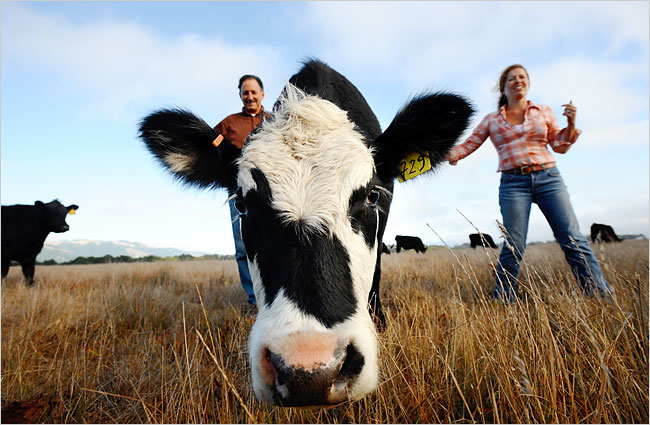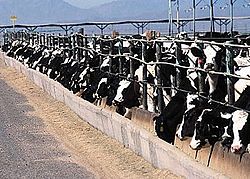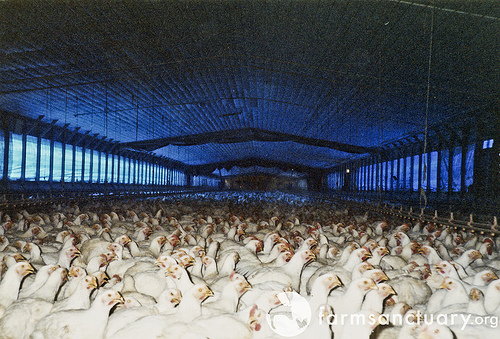Buying Humane.
February 15, 2012

Like most people in this world, I am an animal lover. Growing up, I always wanted to be a veterinarian because I just LOVED animals. I subscribed to magazines like Zoo Books (anyone remember those?), watched a lot of Animal Planet, and adopted wolves and white tigers once a year through several organizations. If I watched special news programs on animal cruelty, my neighborhood friends and I would go door to door asking people to sign a petition against inhumane practices. I was probably no more than 8 years old.
Years later, I still have a love and soft spot for the animals of the Earth and that’s why I feel so strongly about buying food that was raised humanely. I am not a strict vegetarian or vegan by any means, but I try my best to avoid any animal products that were not raised in the most humane ways possible.
According to the website, ”Greenopedia,” the definition of “humanely raised” or “cruelty-free” vary, but the general highlights include:
• The animals must be given sufficient food, clean water, and shelter
• They must have ample space to move so that natural behaviors and instincts are not restricted
• And their environments must not endanger their health or cause undue stress
Unfortunately, HFAC (Humane Farm Animal Care) reports that, “over 10 billion animals raised for food in the U.S. annually endure inhumane treatment,” inferring that farmers and ranchers are not meeting even these most basic needs. The industrialization of agriculture and the farmers’ constant pressure to meet consumer demand for low prices has resulted in massive “factory farms” where animals often live in conditions that many activists refer to as “concentration camps for livestock.”



It should be disturbing for anyone to think about the tight, confined spaces in which livestock on these factory farms must reside. If you’ve ever watched movies like Food Inc., you know that factory farm animals are living in their own filth. They stand and sleep in their own urine and feces, and constantly inhale toxic fumes. They are given feed that their bodies were not meant to process, forcing them to grow faster than their poor legs can actually support. Their food is also pumped with antibiotics in an effort to counter these unnatural feeding methods and prevent the development of disease.
Animals that are raised in these inhumane conditions suffer for their entire lives, and they are not the only ones affected; the environment and human health also suffers.
What can YOU do?
For starters, we can all try decreasing the amount of meat, dairy, and other animal products consumed. Try to have meat-free days at least once a week, if not more!!
At a restaurant, choose a vegetarian option or ask the owner about putting humanely raised foods on the menu.
We can also make a valiant effort to look for animal products that were raised humanely. I try to look for stamps that certify the animals were raised in a humane way OR buy meat, chicken, eggs, and the like, “grass-fed” or “pastured.”
Click the link below to read the full article:
http://thehealthyapron.com

thehealthyapron.com
Posted: February 15, 2012 by Certified Humane
Buying Humane.

February 15, 2012
Like most people in this world, I am an animal lover. Growing up, I always wanted to be a veterinarian because I just LOVED animals. I subscribed to magazines like Zoo Books (anyone remember those?), watched a lot of Animal Planet, and adopted wolves and white tigers once a year through several organizations. If I watched special news programs on animal cruelty, my neighborhood friends and I would go door to door asking people to sign a petition against inhumane practices. I was probably no more than 8 years old.
Years later, I still have a love and soft spot for the animals of the Earth and that’s why I feel so strongly about buying food that was raised humanely. I am not a strict vegetarian or vegan by any means, but I try my best to avoid any animal products that were not raised in the most humane ways possible.
According to the website, ”Greenopedia,” the definition of “humanely raised” or “cruelty-free” vary, but the general highlights include:
• The animals must be given sufficient food, clean water, and shelter
• They must have ample space to move so that natural behaviors and instincts are not restricted
• And their environments must not endanger their health or cause undue stress
Unfortunately, HFAC (Humane Farm Animal Care) reports that, “over 10 billion animals raised for food in the U.S. annually endure inhumane treatment,” inferring that farmers and ranchers are not meeting even these most basic needs. The industrialization of agriculture and the farmers’ constant pressure to meet consumer demand for low prices has resulted in massive “factory farms” where animals often live in conditions that many activists refer to as “concentration camps for livestock.”
It should be disturbing for anyone to think about the tight, confined spaces in which livestock on these factory farms must reside. If you’ve ever watched movies like Food Inc., you know that factory farm animals are living in their own filth. They stand and sleep in their own urine and feces, and constantly inhale toxic fumes. They are given feed that their bodies were not meant to process, forcing them to grow faster than their poor legs can actually support. Their food is also pumped with antibiotics in an effort to counter these unnatural feeding methods and prevent the development of disease.
Animals that are raised in these inhumane conditions suffer for their entire lives, and they are not the only ones affected; the environment and human health also suffers.
What can YOU do?
For starters, we can all try decreasing the amount of meat, dairy, and other animal products consumed. Try to have meat-free days at least once a week, if not more!!
At a restaurant, choose a vegetarian option or ask the owner about putting humanely raised foods on the menu.
We can also make a valiant effort to look for animal products that were raised humanely. I try to look for stamps that certify the animals were raised in a humane way OR buy meat, chicken, eggs, and the like, “grass-fed” or “pastured.”
Click the link below to read the full article:
http://thehealthyapron.com
Category: news